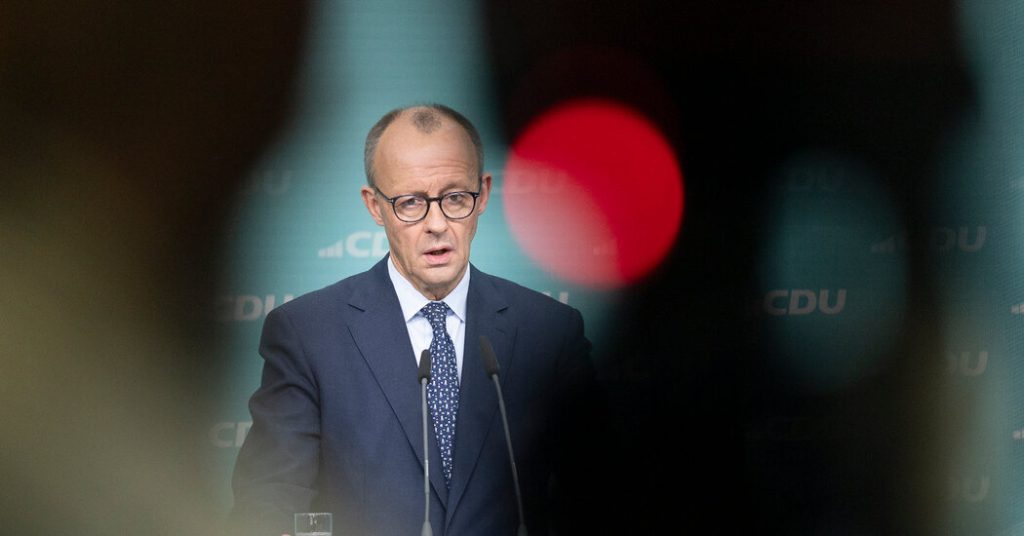Germany’s presumptive next chancellor could be weak from the start, for all sorts of reasons. He didn’t win a particularly high share of votes. Most Germans don’t think he’ll make a great leader. Many of the people who backed his party in Sunday’s elections say they’re not enthused with him, personally.
And yet Friedrich Merz will step into Germany’s top job with an immediate chance to be the most influential German chancellor globally since the financial crisis heyday of his longtime rival, Angela Merkel.
There are two reasons for that. One is President Trump, whose threats to abandon Europe militarily and circumvent it in war negotiations with Russia have given Mr. Merz an immediate foil on the world stage.
The other is the bold, sometimes impetuous, style that has vaulted Mr. Merz to the door of the chancellorship, even as it sometimes alienated friends and foes along the way.
The day after Mr. Merz and his Christian Democrats won a high-turnout parliamentary election and the right to form the country’s next government, the big question in Germany was whether he could deliver the sort of dramatic change that voters said they were craving.
Surveys of people at the polls on Sunday showed widespread national anxieties over the country’s faltering economy, including stagnant growth and a high cost of living, and deep divisions on the hot-button issue of migration into Germany from the Middle East and elsewhere.
They also showed widespread fear among Germans that they are vulnerable to security threats from Russia and the United States, under a shifting world order stirred by Mr. Trump.
Mr. Merz started with one advantage in his quest to address those worries. The final allocation of seats in Parliament will allow him to form a two-party coalition with the left-leaning Social Democrats, and avoid a more cumbersome or fragile three-party coalition. Mr. Merz said he hoped to have coalition negotiations wrapped up by Easter, in just under two months, which would be relatively fast for the traditionally plodding German political system.
Analysts cautioned he might need to move faster, still.
“Friedrich Merz only has this one shot,” said Andrea Römmele, a dean and professor at the Hertie School, a private university in Berlin. “He has to succeed and he knows that.”
Mr. Merz is a businessman, a licensed pilot and a longtime aspirant to the chancellor job. He earned a personal fortune, first as a lawyer and a lobbyist and then as the supervisory board chairman of the German subsidiary of BlackRock, the American investment giant.
In the early 2000s, he lost a leadership struggle in the Christian Democrats to Ms. Merkel, who went on to win four terms as chancellor. He returned when Ms. Merkel announced she was stepping down, but the party suffered a surprising defeat in 2021 to Olaf Scholz and the left-leaning Social Democrats.
“It used to be he’d come home nights,” Mr. Merz’s wife, Charlotte, told a laughing crowd at a rally on Friday in the western city of Oberhausen. “Now, if I want to see him, I have to look at Instagram or turn on the TV.”
He is a man of dry wit, who sometimes appears to enjoy twisting a rhetorical knife. In Oberhausen, he paused in the middle of his closing-argument speech to repeatedly castigate Robert Habeck, the chancellor candidate for the Green Party and the current economy minister. Mr. Habeck was sitting fourth in the polls at the time.
Mr. Merz is sometimes fond of saying things that many German leaders think, but would prefer not to say in public. Increasingly, he has applied that knack to comments about Mr. Trump. Last week, Mr. Merz wondered if the United States would remain a democracy, or if NATO would cease to exist. In a televised round-table on Sunday after polls closed, he said that “it’s clear that this administration is largely indifferent to Europe’s fate.”
Analysts and fellow politicians describe Mr. Merz as a fan of bold action and brash promises, which do not always work out. He won his party leadership post in part by promising to cut voter support for the hard-right Alternative for Germany Party, or AfD, in half. Instead, the party doubled its vote share on Sunday, compared with the last parliamentary election.
In January, comfortably ahead in the polls but worried about the AfD gaining ground on him, Mr. Merz took a political gamble.
Mr. Merz, who had already pushed the Christian Democrats to the right on migration, forced a vote in Parliament on a package of tough-on-migrant measures. He knew it could only pass with votes from the AfD, which has long made migration a signature issue. The ploy broke a decades-long taboo in German politics.
Protests ensued across the country. The Christian Democrats initially appeared to have suffered little damage from it, but they ended up winning a lower vote share than polls suggested they would before the gambit.
It galvanized the traditional party of the far left, Die Linke, which took votes on Sunday in part from the more center-left Green Party.
That shift ended up hurting Mr. Merz. He was not able to form a two-party coalition with the Greens, reducing his leverage in negotiations with the Social Democrats over ministry posts and planned legislation.
He also might no longer have the votes in a new Parliament to pass a key priority — a major increase in military spending, financed by an increase in government borrowing, which would require a two-thirds majority to pass.
Mr. Merz acknowledged as much at a news conference on Monday. He also suggested a potentially creative way around the problem: working with the Greens, the Social Democrats and the Free Democrats, or F.D.P., in a lame-duck session of Parliament.
The goal would be to relax borrowing limits and accelerate the nation’s rearmament, to better prepare for the possibility of America withdrawing troops and its longstanding security guarantee from Germany. Such legislation may need to be fast-tracked before the Parliament changes and passing it gets harder.
He set a March 24 deadline for those talks, the last day the old Parliament would be active.
“I would first like to hear the views of the Social Democrats, the Greens and the F.D.P. before we come to any decisions here,” he said. We all know that the Bundeswehr” — the German military — “will need a great deal more money in the next few years. We need to talk about how we organize that.”
Diplomats and analysts expressed some optimism on Monday that Mr. Merz could deliver domestically and step into a leadership vacuum in Europe.
“Many in Paris place a lot of hope in Merz,” said Camille Grand, a distinguished policy fellow at the European Council on Foreign Relations.
The French, he added, “hope Germany will now move faster and be an active part of these debates: to bolster European defense capabilities and think about how to defend Europe with less or no America.”
Mr. Merz sounded similar themes in his news conference, though he pulled back his critique of Mr. Trump, at least slightly.
“I remain hopeful that we will succeed in maintaining the trans-Atlantic relationship,” he said. He added: “If it were to be destroyed, it would not only be to the detriment of Europe, but also to the detriment of America.”







